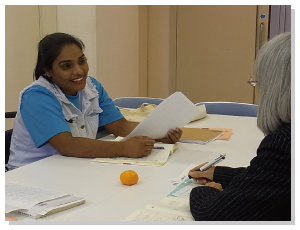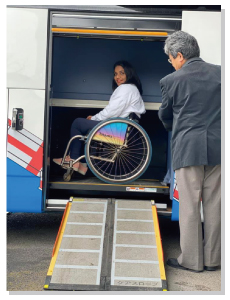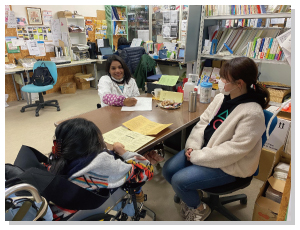- HOME
- Alumni News
- Anju Baral (participated in the 21st Program)
- Final Report
Final Report
Anju's Final Report
Disability movement can change society
Hello, everyone! My name is Anju, I am from Nepal. I have spinal injury. From last September in 2019, I arrived in Japan and learned many things.
1. Japanese language
The first thing I learned after setting foot in Japan was Japanese. As I had never studied Japanese in Nepal, it was very difficult for me, but interesting. Thanks to my teachers, I able to speak Japanese since my individual Japanese training started.

2. Group training
After the Japanese lessons, our group training started. During the group training we studied Japan’s welfare systems, leaderships, and rights of persons with disabilities. There was also group training after the individual training, which included DET (Disability Equality Training) and how to write proposals. After studying various subjects in the group training, I felt that Japan’s welfare system is very much better than that of Nepal.
3. Individual training
I went to Center for Independent Living “Higashiyamato” for my first individual training. At Higashiyamato, I learned about how to make plan of personal assistant service and peer counselling. I also visited the homes of persons with severe disabilities. Until then I had never seen a person who using a ventilator. It is most likely that there are no ventilators in Nepal, meaning that people with severe disabilities probably pass early.
Next, I visited Center for Independent Living “Iruka” in Okinawa. At Iruka, I learned about independent living movement, participated in personal assistant training and barrier-free checking, and the situation of lives of people with various disabilities. During stay at Iruka, I also had a chance to visit Center for Independent Living “Kirara” in North of Okinawa, where I learned about agricultural work for people with intellectual disabilities and discriminations against people with Hansen’s disease.
Through the training, I realized that disability movement can change society. Now, Japan’s services for people with disabilities are so good. It is the result of the big efforts of disability movement for long time. Disability movement is important. I learned that unless people with disabilities voice or their opinions, society will never change.
Next, I visited Independent Living Center “TEKUTEKU” in Kagoshima, to learn about sports and the philosophy of independent living. I enjoyed it so much because I love sports. For the first time in my life, I played a wheelchair tennis and wheelchair soccer. Electric wheelchair soccer is a sport that anyone can enjoy, even those with severe disabilities. It is wonderful. However, unfortunately there are no electric wheelchairs in Nepal.

My next training place was AJU Center for Independent Living in Nagoya. AJU has many divisions, and many types of work. I especially liked “Wadachi Computer House” and “Aichi TRY”.

At Wadachi Computer House, people with severe disabilities were working on their PC. In Nepal, people with severe disabilities couldn’t have any work. I really thought it wonderful that people with severe disabilities were working, not just working but very happily.
Aichi TRY makes barrier-free stickers with the money they makes and sells T-shirts. They visit companies and stores wearing the T-shirts, and then they ask the companies and stores to make barrier-free building. If the companies and stores understand and accept the barrier-free concept, Aichi TRY gives them the stickers. The people at the stores can put up the stickers in their stores and appeal that they support the barrier-free concept. It is a wonderful and useful activity that makes people with disabilities and stores both of happy. This activity is collaboration of young people with disabilities and college students. Through the activity, people with dishabilles and college students become a good relationship such as friends, and begin to understand the disabilities more. It is another reason why this activity is so good. It is possible for having similar activity in Nepal because I think it don’t need too much cost.
4. New experiences in Japan
Some things made surprised me in Japan, for example, vending machines and toilets. In Nepal, there are no vending machines. Japanese toilets have function of washing by water and drying by air, and barrier-free design too. Japanese toilets can be operated by buttons. So, it is very accessible and convenient for people with severe disabilities.
When I used a barrier-free toilet for the first time, I couldn’t understand Japanese and figure out how to operate the toile because all instructions were in Japanese. It took an hour until I managed to come out the toile room. I think that English instructions would make easier for foreign visitors to use barrier-free toilet.
Hieu and I always hung out together after we finished studying. One day, we went to outside, I was clutching the handle of Hieu’s electric wheelchair. Then I missed small steps on the road and fell down from my wheelchair. Hieu, in her wheelchair, was okay but couldn’t pull up me. She said me, “sorry, sorry!” Hieu asked a Japanese person nearby for help. The first person was busy and couldn’t help us but the second person helped us. It was a funny experience.
I have enjoyed alcoholic drinks in Japan too much! In Nepal, I had no experience to drink. But it was fun and uplifting to enjoy drinks with friends in Japan.
Other wonderful or fantastic activities were being on a boat in Kobe and going skiing. In Japan, most places are barrier-free, so I was able to experience many things.
5. Home-stay
During the home-stay program, I went to camping with my host family. It was great fun. My family was so kind. It was like being with my own family in Nepal. Dad was a funny man. Mum always showed me many things, like Japanese culture and language. Her cooking was also fantastic. I wore a kimono and visited temples with them. These experiences were so enjoyable for me because I learned Japanese culture through my home-stay program.
6. My goals in Nepal
During the individual training, I learned about disability movement. When disability movement develops in Nepal, I think it will change society. So, I would like to get involved in various activities in Nepal, for instance, peer counseling, barrier-free checking, and making good experience room for independent living. I would like to work with my best because the situation of people with disabilities is so hard in Nepal. I also would like to create a basketball team for people with disabilities. We can make new friends through sports. Sports can also empower people with disabilities. I would like to apply sports to enhance disability movement and change society. I believe that disability movement can change society.
7. Changing after coming to Japan
Coming to Japan, it makes me changed. I studied Japanese and eventually became able to communicate with Japanese people and got skill of swimming. Now, I have the confidence to enhance disability movement since I go back to Nepal.
Thank you for everyone at Duskin Ainowa Foundation, everyone from the Duskin family, for having given me this opportunity. I am grateful from the bottom of my heart.
Last but not least, I would like to thank everyone who I met and helped me in Japan.




